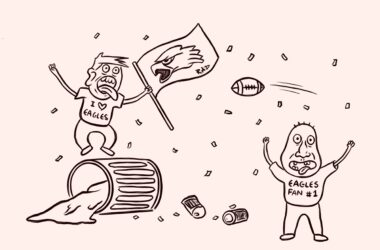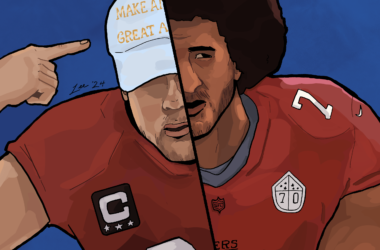After suffering two injuries in his first university season at the University of Calgary, third-year transfer running back Daniel Adesegun was unsure if he would ever play football again. But, now that he has completed two standout seasons at McGill, it is clear that Adesegun successfully kicked off a new chapter in his athletic and academic career.
Hailing from Corbyn, Texas, Adesegun’s love for football grew out of watching games on TV at the young age of six. He enjoyed watching running backs and big, bruising hits, and, decided that he was going to play football.
“My entire focus was football,” Adesegun said in an interview with The McGill Tribune. “I didn’t care about school. I just played football.”
Adesegun continued to play after his family moved to Calgary, Alberta when he was 12 years old. When the time came, he signed with the local University of Calgary to begin his collegiate career. The Dinos appealed to him as a perennial championship contender with quality player development.
Adesegun noted a drastic transition from the low-contact-level game of his early years in football to the high-intensity play he experienced in his first collegiate season.
“It’s totally different,” Adesegun said. “It changes how you play. I don’t want to say there is more fear, but there’s certainly a different dynamic. [The game becomes] more structured, more strategic.”
Unfortunately, Adesegun suffered a broken wrist early in his first season at the University of Calgary, and, when he returned, he badly sprained his ankle. The consecutive injuries made him reconsider whether he wanted to keep playing football.
“I think it’s about love,” Adesegun said. “To play football, especially at this level, you have to really love what you are doing [by putting] your body and […] your mind [at] that kind of risk.”
After consulting with a close friend, Adesegun ultimately decided that his passion for the sport outweighed the risks involved. Consequently, he began the search for his next destination, a school where he could both play football and pursue his academic passions.
After looking into several schools, Adesegun landed at McGill. At first, he struggled to adjust to life both academically and socially. However, a supportive team environment helped Adesegun adapt to his new city.
“Everyone’s there for you and supporting you, so that was great,” Adesegun said. “[My first season] wasn’t the best season, record-wise [for McGill], but I think that getting back into it was really great for […] the way I felt about myself.”
While McGill finished just 1-8, Adesegun enjoyed a successful individual season, walking away with the RSEQ Offensive Rookie of the Year award.
In the 2018 season, the McGill football team continued to struggle to win games, leaving Adesegun disappointed. He was encouraged, however, by how the team came together toward the end of the season. Moving forward, Adesegun’s goals for the team are simple.
“Compete,” Adesegun said. “Compete in the playoffs [… and] compete hard.”
Adesegun is an integral part of the team. The running back prefers to lead by example, and his statistics make that clear. He led McGill in rushing yards and tied for the team-best mark in touchdowns this past season.
“You want to do the best you can individually to support the team,” Adesegun said. “If I’m not performing up to par, […] then we aren’t going to reach our potential.”
To get ready for games, Adesegun makes sure to get lots of rest. He spends time visualizing the game and listening to soft music.
“I like to come out before warm-up and do my own warm-up,” Adesegun said. “I like to get out there, lay down, and […] just be there with the field and get peaceful.”
Adesegun acknowledges that this routine is different from the typical, higher-energy warm-up of some of his teammates. However, his way is one that has successfully created a dynamic, accomplished competitor, who—despite any injury—will not be going anywhere anytime soon.









